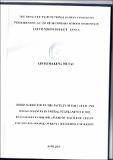The impact of dysfunctional family systems on performance ; a case of secondary school students in Imenti North District - Kenya

View/
Date
2013-06Author
Mutai, Edith Makena
Type
ThesisLanguage
enMetadata
Show full item recordAbstract
A dysfunctional family system is a family in which conflict, misbehavior, and often abuses impact negatively on the part of individual members and occur continually. When problems and circumstances such as parental alcoholism, mental illness, child abuse, or extreme parental rigidity and control interfere with family functioning, the effects can sometimes linger long after these children have grown up and left their problem families. Adults raised in dysfunctional families frequently report difficulties forming and maintaining intimate relationships, maintaining positive self-esteem, and trusting others, they fear a loss of control, and deny their feelings and reality. This has put into question the extent to which dysfunctional family systems affect performance of secondary school students, how these effects can be identified and how they can be dealt with. The study was guided by four research objectives which were concerned with the determination of the relationship between dysfunctional families and their effects on children's discipline, academic performance, personality and socialization. The study adopted a descriptive research design. The target population comprised of all principals teacher counselors and students, giving a total of 17,328 subjects. A sample of 132 subjects was purposefully and randomly selected from the target population. The researcher used a questionnaire and a document analysis guide to collect the data from the respondents. Reliability of the research instruments was estimated through use of split half reliability method. In this case the reliability coefficient was 0.74. Data was organized then analyzed with the help of SPSS version 17 computer software. Both quantative and qualitative methods were used in the analysis. The results were presented using frequency tables. After interpretation of the results it was concluded that dysfunctional families systems generally have a negative effect on students discipline, academic, performance, personality and socialization. It was therefore, recommended that student teacher counselors and principals should work together to assist the students in the alleviation of the negative effects of dysfunctionalism.
Publisher
KeMU
